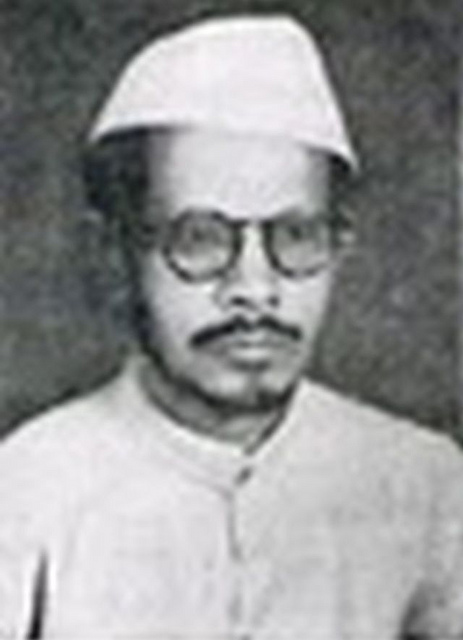There are many people who fought for India’s freedom and sacrificed their life and comfort so that we can live in a free country, but it is tragic that they could not find their rightful place in the history. Mr. Niamatullah Ansari of Gorakhpur is one amongst them. Apart from a freedom fighter, he was a crusader for social justice, and also left an impact as a person of letters, for his contribution to the Urdu literature.

Image: Two Circles
Mr. Niamatullah Ansari was born in a well to do family of Gorakhpur on September 28th, 1903. In 1920, when Mahatma Gandhi launched the non-co-operation movement, he denounced his education in Calcutta (now Kolkata) at an early age of 18 years, and returned back to Gorakhpur to participate in the movement. He got so involved in the freedom struggle that he could not complete his higher education.
Niamatullah Ansari
He was instrumental in establishing the local unit of the Congress Party in Gorakhpur, and in 1925 he participated as a representative at the All India Congress Committee session, which was held at Kanpur. In 1936, he was elected President of the City Congress Committee of Gorakhpur and further held other offices of responsibility in the party.
He was given the charge of the Namak Satyagrah Andolan movement in 1930 under the command of Mahatma Gandhi. In 1940, an extraordinary meeting of the Provincial Congress Committee was held in Gorakhpur, and on his instance Pundit Jawaharlal Nehru, who was the President of the Provincial Congress Committee, accepted the invitation and delivered a hard blowing speech where he called the people to rebel against the British Raj. This was the turning point in the struggle for freedom. Consequently Nehru was arrested in Gorakhpur and after the historic trial was sentenced to four years of rigorous imprisonment.
Late when the Satyagrah Aandolan caught the imagination of the Indian masses, Mahatma Gandhi nominated him as the first Satyagrahi from the Gorakhpur region, which was a great honor in itself. He was arrested and sentenced to one and half years of rigorous imprisonment and a hefty fine of four hundred rupees were imposed on him. He was taken to Ghazipur and kept in jail there along with other freedom fighters. In 1942, during the “Quit India Movement”, he was arrested under the infamous DIR and was imprisoned for two and half years in the Naini jail of Allahabad along with the senior leaders of the country.
He was strictly against the Muslim League’s ideology of Two Nation Theory, and the partition of India was totally unacceptable to him. He along with others opposed the Muslim League by aligning with the Momin Conference and played a pivotal role in organizing the Momin Conference session in Gorakhpur in 1939 under the tutelage of his father-in-law Janab Murtaza Husain. It may be recalled that the Momin Conference later joined hands with the Indian National Congress and took active and assertive part in the freedom struggle.
Later he was elected to the State Assembly from Gorakhpur in 1962 with a huge margin. It may not be out of place to mention that the Gorakhpur assembly seat was previously held by his brother-in-law Janab Istafa Husain in the previous two elections. Unfortunately, he could not complete his term and became bed ridden due to an attack of paralysis and after a prolonged illness died in 1970.
Mr. Niamatullah Ansari will be remembered as Mohsin-e-Qaum for upholding the honor of oppressed and marginalized sections of the Muslims, who were discriminated, insulted, and ridiculed by the so called Ashraf of the society. He stood firm against the Zamindarana Nizam, under which the low caste Muslims were declared Razeel or inferior, and were compelled to pay Razalat Tax. He did not only refuse to pay this discriminatory tax which was like peanuts to him, but he convinced others also not to pay. The infuriated Zamindar filed case in the lower court of Gorakhpur against him, and prayed that he being a Razeel he be directed to pay the tax. Some 75 years ago, the legal battle of Ashraf vs. Arzal based on the premise whether Julahas (Weavers) are Razeel or not, was fought in the Gorakhpur Court and thereafter in the Allahabad High Court, is of historical significance. He won the legal battle and the courts gave its verdict that Julahas are not Razeel, and the Zamindar of the time has no right to levy the Razalat Tax from them and other deprived sections of the society. The Razalat Tax having set aside, the down trodden could live with honor was mainly due to his brave efforts. Today when everybody is taking the cause of social justice and equality, we fail to mention the contribution of Mr. Niyamatullah Ansari who was the first crusader who took this cause. Later his legacy was passed to his favorite nephew, and my father late Ashfaq Husain Ansari, who continued the battle which his Mamoon championed.
He had special attachment with Urdu. He began writing at an early age and his articles were regularly published in leading Urdu journals of those times. One of his noble literary companions was famous Majnu Gorakhpuri, who later moved to Pakistan. Since his literally contributions are beyond the scope of this article, they will be discussed some other time.